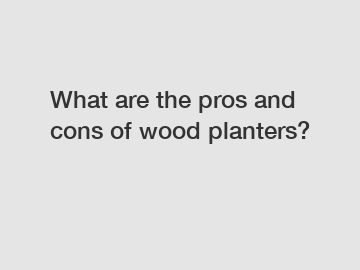Jan. 20, 2024
Home & Garden
Wood planters have long been a popular choice for gardening enthusiasts, and it's easy to see why. They bring a touch of nature to any space and add a rustic charm that is hard to replicate with other materials. However, like any gardening option, wood planters also have their pros and cons.
Let's start with the pros. First and foremost, wood planters are aesthetically pleasing. Their natural appearance and warm tones create a delightful ambiance, whether you place them on a balcony, terrace, or in your backyard. They effortlessly blend in with surrounding vegetation, offering a seamless integration that enhances the overall beauty of your garden.
Another advantage of wood planters is their versatility. You can find them in various shapes, sizes, and designs, ensuring that there's a perfect fit for any garden style or personal preference. From traditional rectangular planters to more unique and intricate designs, the options are endless. Additionally, wood can be easily customized to match any color scheme or theme, allowing you to unleash your creativity and add a personal touch to your outdoor space.

Wood planters also provide excellent insulation for plant roots. Unlike plastic or metal planters, wood naturally regulates the soil temperature, preventing it from overheating during scorching summer days or getting too cold in winter. This insulation not only protects your plants but also promotes healthy growth and development, ensuring that they thrive in their environment.
Another pro worth mentioning is the eco-friendliness of wood planters. Choosing wooden planters made from sustainably sourced materials supports responsible forestry practices. Additionally, wood is biodegradable, making it a more environmentally conscious choice compared to plastic or other synthetic materials commonly used in gardening. By opting for wood, you can contribute to the preservation of our planet for future generations.
However, despite these benefits, wood planters have their fair share of cons. One prominent disadvantage is their susceptibility to decay and rot. Over time, exposure to moisture, extreme weather conditions, and insects can cause the wood to deteriorate. To combat this, regular maintenance is required, such as treating the wood with appropriate sealer or paint and ensuring proper drainage to avoid water accumulation. Failure to maintain the planters properly can lead to a shortened lifespan and the need for replacement sooner than expected.
Wood planters also require more frequent watering compared to other materials. Although wood absorbs some moisture from the soil, it also tends to lose water faster due to its porous nature. This means you may need to water your plants more frequently, especially during dry spells, to prevent them from drying out. It's essential to keep this in mind, especially if you have a busy lifestyle or tend to forget about watering your plants regularly.
In terms of weight, wood planters can be quite heavy, especially when filled with soil and plants. This can pose a challenge if you plan on rearranging your garden frequently or have limited strength for lifting and maneuvering heavy objects. However, it's worth noting that lightweight options are available, such as cedar or redwood planters, which offer durability without the excessive weight.
Lastly, the cost of wood planters can be a deterrent for some. Compared to plastic or ceramic alternatives, wood planters tend to be pricier due to the material's quality and aesthetic appeal. However, keep in mind that investing in wood planters often pays off in the long run, as they tend to be more durable and ultimately offer better value for money.
In conclusion, wood planters have several pros and cons that must be weighed before making a decision. Their natural beauty, versatility, insulation properties, and eco-friendliness make them an excellent choice for garden enthusiasts. However, the need for regular maintenance, increased watering demands, susceptibility to decay, weight, and potential higher cost should also be considered. By carefully assessing these factors, you can determine whether wood planters are the perfect fit for your gardening needs and create a beautiful, sustainable, and thriving outdoor space.
Contact us to discuss your requirements of plant saucers wholesale, wholesale plastic plant trays , wholesale square plant saucers. Our experienced sales team can help you identify the options that best suit your needs.
If you are interested in sending in a Guest Blogger Submission,welcome to write for us!
All Comments ( 0 )